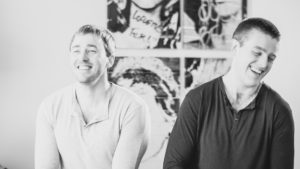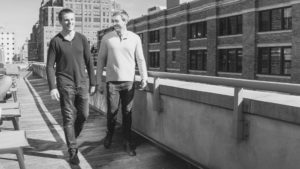Written by Caroline Newman
Photos courtesy of the University of Virginia Office of Communications
 UVA grads Bradford and Bryan Manning have launched a company with a charitable aim: curing the disease that is robbing them of their sight.
UVA grads Bradford and Bryan Manning have launched a company with a charitable aim: curing the disease that is robbing them of their sight.
Each shirt in University of Virginia graduates Bradford and Bryan Manning’s new clothing line features a small metal tag imprinted with a series of raised dots – braille for “brother.”
That small detail neatly captures the mission behind the Mannings’ newly launched clothing company, Two Blind Brothers. All proceeds from the company go directly to blindness research, funding testing for new gene and stem cell therapies that could slow or even reverse vision loss.
The cause is very personal for Bradford and Bryan, who were each diagnosed with Stargardt disease in early elementary school. The degenerative eye disease, which affects about one in 10,000 people in the U.S., gradually erodes patients’ central vision, leaving them with an ever-expanding blind spot. By the time the brothers, who grew up in Charlottesville, attended UVA, they were operating with precious little central eyesight.
“We’ve developed our own systems to address problems,” Bradford said. “You ask a lot of strangers a lot of questions. I take a lot of pictures of things on my phone and then zoom in. At UVA, I almost always carried a little magnifying glass in my pocket.”
 “It is really hard to recognize faces, especially of fairly recent acquaintances,” Bryan said. “You develop a habit of talking to someone and keeping it kind of ambiguous at first, until you can figure out who they are.”
“It is really hard to recognize faces, especially of fairly recent acquaintances,” Bryan said. “You develop a habit of talking to someone and keeping it kind of ambiguous at first, until you can figure out who they are.”
After UVA, the brothers ended up working in New York City. Bradford, who graduated in 2007 from the McIntire School of Commerce, is now a managing partner in a private investing firm. Bryan, who graduated with a degree in statistics in 2013, works as a sales representative for SNL Financial. Both brothers decided not to take a salary from their new company so that all proceeds from Two Blind Brothers can go directly to research.
“We are both fortunate to have incomes from other jobs and ventures, so we wanted to pledge 100 percent of all proceeds to the cause,” Bradford said.“For us, this is a new and fun vehicle to give back to a cause that means the world to us,” Bryan added.
Bradford, graduated from the McIntire School of Commerce in 2007. His younger brother Bryan, graduated in 2013 with a degree in statistics. Both brothers now live in New York City. After deciding to start the company last summer, the Mannings spent a year selecting fabrics, designing shirts and overseeing the manufacturing process. Reflecting the tactile way that they and others coping with blindness navigate the world, the brothers focused closely on the quality of the fabric and feel of the shirts. Currently, they offer casual shirts in both short and long-sleeve styles. Each shirt carries the signature braille tag, which the Mannings plan to customize based on the theme they want to convey or the location where shirts are being sold.
All of the company’s production facilities are in New York, including a fabric mill in the Bronx and a design studio in Manhattan. Building those partnerships was a key step for the Mannings, who had little previous experience in the clothing business.
“As an entrepreneur, when you have to run 100 percent of the company, you inevitably run into things that are not really your strong suit,” Bradford said. “We had to get a lot of advice and talk to a lot of experts.”
The research aspect of the company was more familiar to the brothers. Both had long been involved with the Foundation Fighting Blindness, for which Bradford serves on the board of directors. Initially, the Mannings plan to distribute proceeds from Two Blind Brothers through the foundation’s network of researchers.
“Right now, we have a list of about 10 research opportunities that we are interested in,” Bradford said. “Broadly, we are looking at a lot of gene therapy and stem cell treatments.”
Those therapies aim to alleviate blindness either by replacing diseased cells with healthy stem cells or by transplanting normal genes in place of missing or defective genes. Many companies are testing these methods with hopes to bring them to market soon.
“What is fascinating is that there is kind of a medical revolution going on with gene and stem cell therapies. Companies are already trying to commercialize these methods and treat patients,” Bradford said. “It is less a question of if it can be done and more a question of bringing the research through expensive clinical trials.”
The Mannings hope that Two Blind Brothers can raise money for those crucial clinical trials, both directly by selling their shirts and indirectly by raising public awareness. Already, they have been amazed by the attention their new venture has garnered.
“We launched a few weeks ago with a post on Facebook that has already been shared to 100,000 people. One of the best things about founding Two Blind Brothers has been the outpouring of support from friends, family and strangers,” Bryan said. “That has been the biggest positive for me.”


